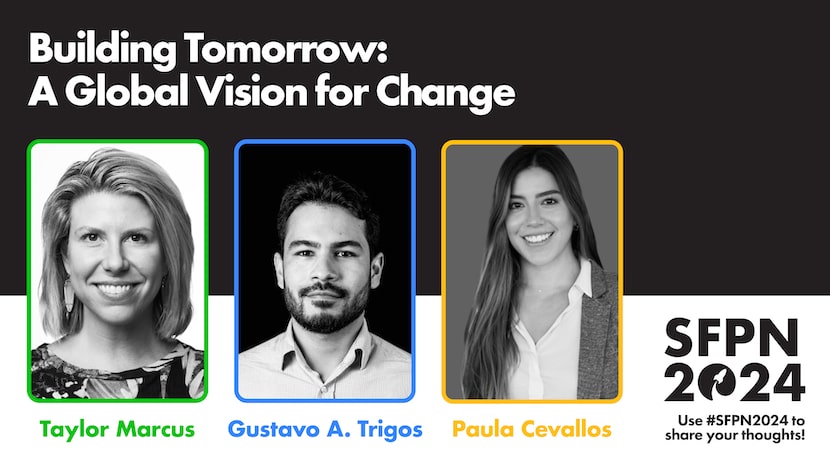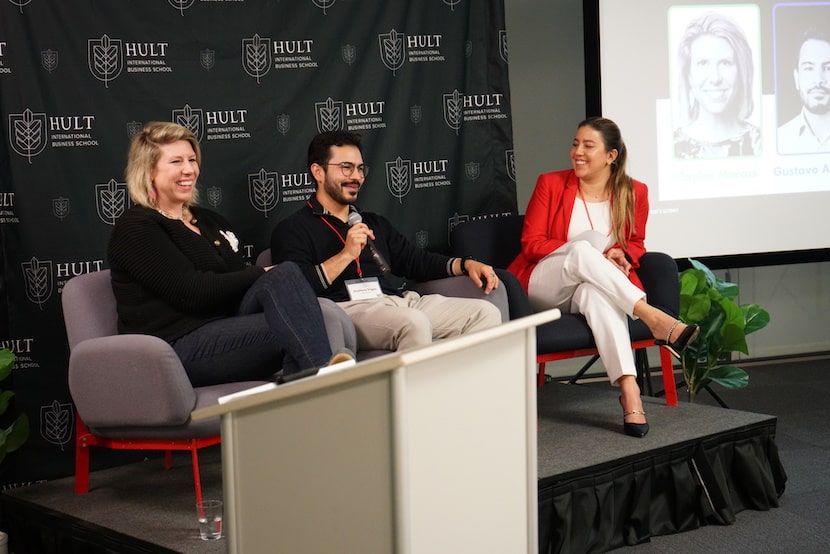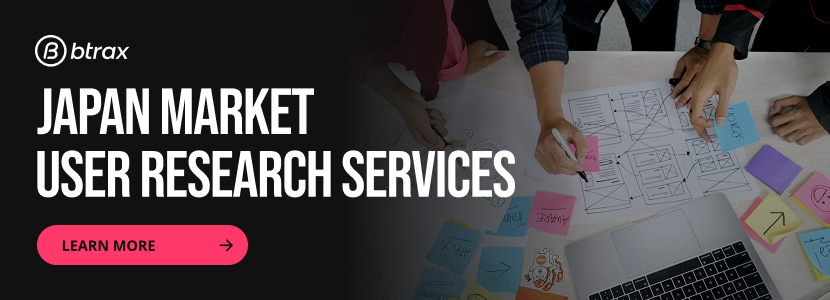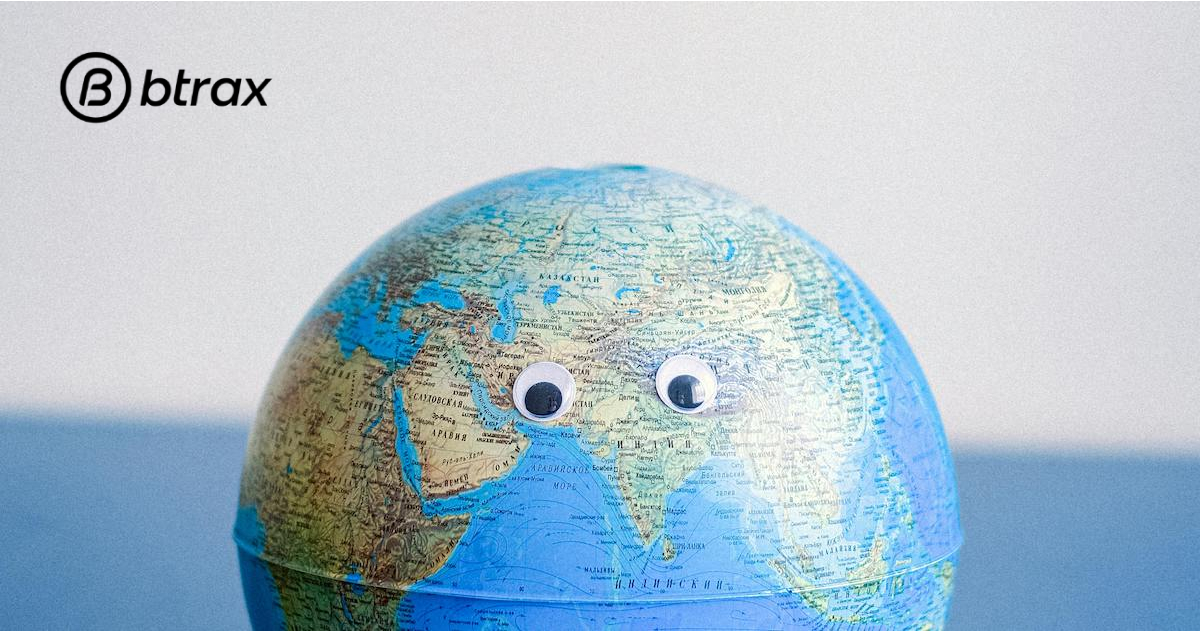
Btrax Design Company > Freshtrax > Building Tomorr...
Building Tomorrow: A Global Vision for Change
At our recent event, SF Pitch Night 2024, Taylor Marcus and Gustavo Trigos were guest speakers on the discussion panel, “Building Tomorrow: A Global Vision for Change” moderated by HULT International Business School‘s very own Paula Cevallos.
The conversation ventured into the depths of innovation, global expansion, and the impact of entrepreneurship on societal transformation.
Taylor Marcus is celebrated for her innovation at some of the world’s leading companies like Google, YouTube, and Instagram, and now as Head of Business Development at Berkeley SkyDeck.
Gustavo Trigos is known for his entrepreneurial spirit as the CEO and Co-Founder of his SF-based tech startup, Mentum.
Watch the recording of the panel discussion “Building Tomorrow: A Global Vision for Change” here or continue reading the highlights of the discussion below.
What is Innovation?
The dialogue opened with reflections on the meaning of innovation.
“It’s about change, creativity, and imagination,” said Marcus as she discussed the ever-growing importance of creativity in the realm of innovation.
She emphasized the importance of interdisciplinary approaches, particularly at the intersections of technology, healthcare, and climate change, to drive future innovations.
Trios shared his journey from aspiring to be an investment banker to founding a fintech company that aims to simplify B2B transactions in emerging economies.
“Something I’ve learned throughout my entrepreneurial career is that there are tons of problems, and there’s always a way to make something a lot better,” said Trios.
Both panelists concurred on the essence of innovation as a tool for solving issues and creating value in a rapidly changing world.
Localizing Innovation
Trios elaborated on Mentum’s challenges and strategies in Latin America. He highlighted the importance of understanding local cultures, regulations, and business practices to successfully enter new markets.
Gustavo mentioned that if you are looking to enter and expand to international markets, one easy option is to work with companies like btrax that are already present in the target culture, this can allow you to do more of a soft launch or landing in a country.
“You can use local resellers and partners, they know what they’re doing, but also just embrace it. Like, if you’re going to launch the Brazilian Market, go to Brazil, learn the culture, learn the languages,” said Gustavo passionately as he recounted his experience learning Portuguese when he entered the Brazilian market.
Trios also recommended reading the book, “The Culture Map: Breaking Through the Invisible Boundaries of Global Business” by Erin Meyer, as a great resource on the importance of adapting and learning about local cultures.
“You have to be unrelenting and just willing to get knocked down, time and time and time again,” added Marcus.
She continued by emphasizing the importance of setting touch points and milestones along the way to reaching your goal. By reverse engineering the final goal or outcome, it can help make the journey seem clearer and goals more achievable.
Global Expansion and Innovation
“Launching in New Markets is tricky,” admits Taylor, however, “being Global is more important than ever.”
Taylor mentions three keys to success when working on global expansion:
- Understanding cultures, and entering unfamiliar markets is especially challenging. A shift in mindset is required for global businesses as opposed to local or domestic businesses.
- Willingness to take risks and make mistakes and continue to make mistakes without giving up.
- Having a vision and a drive to push your idea forward.
Gustavo spoke about how when companies expand, they often think of only expanding to places with complimentary languages, however, this often means expanding to a location that is geographically far.
“Why do you need to go to the other side of the world to expand?” says Gustavo. He proposed that expansion by geographic proximity is an often overlooked but promising way to begin global expansion efforts.
“I’m a very big believer that a lot of new companies will start to be Global from day one,” asserts Gustavo. Although issues can arise when it comes to payments and direct sales, the internet allows us to easily have global teams and create products that are globally accessible.
Entrepreneurship and Social Change
Gustavo explains how starting a company can create social change from the start by giving unique work opportunities to people around the world.
Entrepreneurship can also lead to new and better solutions that challenge what is already widely accepted and used. When entering a new culture you may also have the opportunity to introduce fresh ideas and creativity that may not have previously existed in the culture.
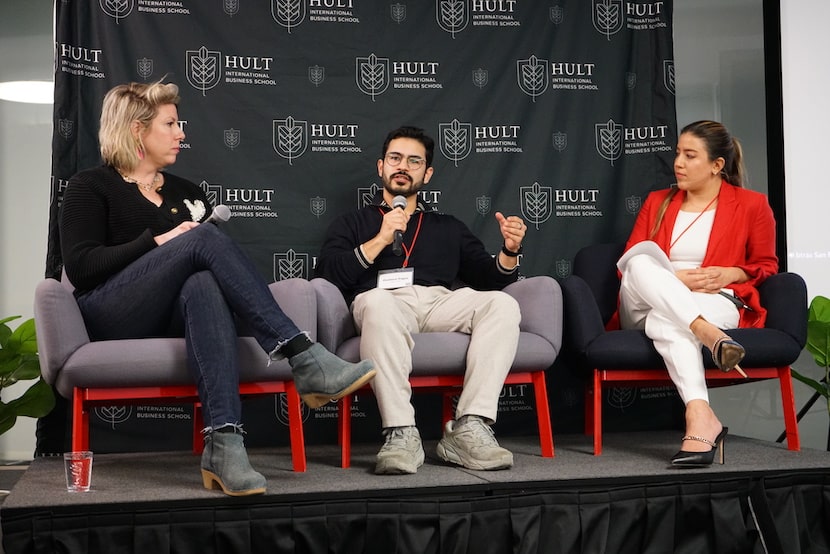
Looking to the Future
Taylor mentioned Climate Tech and ESG as the future of entrepreneurship, expressing excitement about the advances in Climate Tech that are emerging across the world.
Gustavo expressed excitement about how ChatGPT is expediting people’s ability to problem-solve and develop their ideas.
Conclusion
In essence, this panel shed light on the multifaceted nature of innovation, the strategic considerations for global expansion, and the pivotal role of entrepreneurship in driving societal progress.
The panelists’ experiences and insights underscored the importance of creativity, adaptation, and a relentless pursuit of solutions that solve today’s problems and pave the way for a more sustainable and inclusive future.

